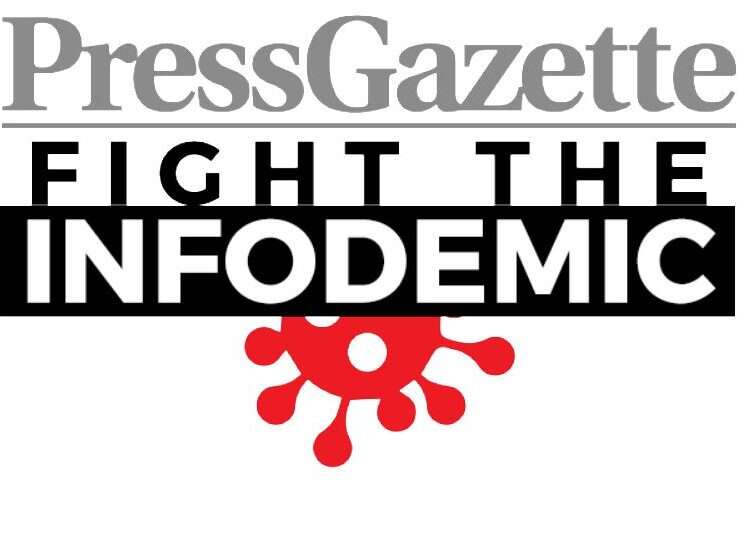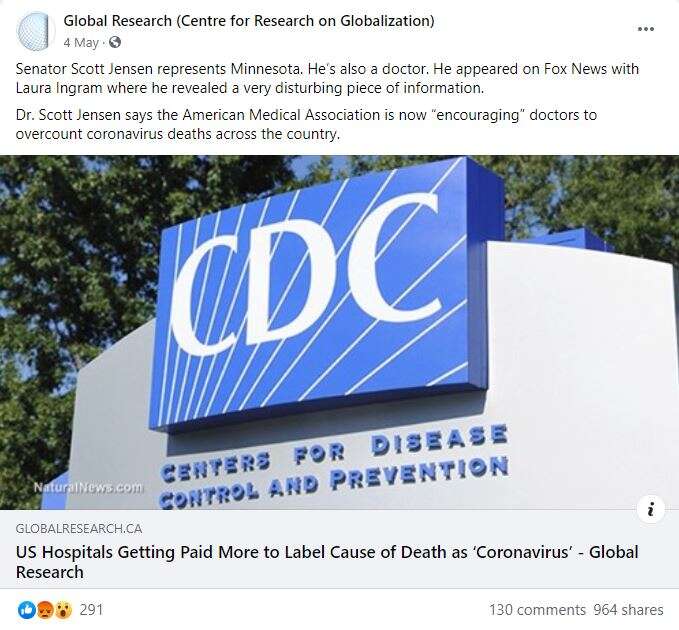
Facebook is failing to keep people safe and informed during the pandemic, according to new research looking at the spread of “fake news” about Covid-19 on the social media platform.
In its report, US non-profit Avaaz said it had uncovered networks spreading health misinformation online and on Facebook that reached 3.8bn views in the year to 27 May across the US, UK, France, Germany and Italy.
These health misinformation networks – made up of 82 websites and 42 Facebook pages – peaked at an estimated 460m Facebook views in April 2020, at the height of the pandemic, the report said.
Avaaz said content from the top ten fake news websites had almost four times as many estimated views on Facebook as equivalent content from the websites of the top ten leading health institutions.
“Many of these networks, made up of both websites and Facebook pages, have spread vaccination and health misinformation on the social media platform for years,” it said.
“However, some did not appear to have had any focus on health until February 2020 when they started covering the Covid-19 pandemic.”
Top ten “super-spreader” Facebook pages for Covid-19 misinformation (Avaaz report):
| Rank | Facebook page | Estimated views |
| 1 | Dr. Joseph Mercola en Español | 101,899,218 |
| 2 | Bradlee Dean | 97,745,513 |
| 3 | Collective Evolution | 72,804,365 |
| 4 | Waking Times | 50,094,659 |
| 5 | The Farmacy | 42,061,115 |
| 6 | Jeda news | 36,601,124 |
| 7 | Realfarmacy.com | 28,415,650 |
| 8 | Grow Food, Not Lawns | 28,312,274 |
| 9 | Wake Up World | 23,121,071 |
| 10 | The Truth About Cancer | 22,559,261 |
| Total | 503,614,250 |
Press Gazette recently launched our Fight the Infodemic campaign, which aims to stop tech platforms from promoting misinformation about vital issues like Covid-19 and instead favour evidence-based journalism from bona fide news outlets.
In its report, published on Wednesday, Avaaz proposed a two-step solution to what it also dubbed the “infodemic” on Facebook, which involved sending corrections to all users who had seen misinformation and downgrading misinformation posts and agitators in users’ News Feeds.
It estimates this would halve the number of people holding false beliefs on Covid-19 and cut misinformation networks’ reach by up to 80%.
But Avaaz said Facebook had “yet to effectively apply these solutions at the scale and sophistication needed” to defeat the infodemic.
Among the fake news shared on Facebook was a claim (below) that the American Medical Association was encouraging doctors and US hospitals to “overcount” Covid-19 deaths, which reached an estimated 160.5m views, Avaaz said, the highest of any other misinformation post.

An article containing what Avaaz said were “bogus cures” reached an estimated 4.5m views on Facebook.
Public pages are helping to drive health misinformation on Facebook, the report said, accounting for 43% of all views to health misinformation websites identified by Avaaz. The top 42 pages, dubbed “super-spreaders” in the report, generated an estimated 800m views.
The report claims that Facebook’s News Feed algorithm was boosting content from the health misinformation networks while at the same time the platform was trying to counter the problem, offering free adverts to the World Health Organisation and showing general notifications to users who engaged with harmful Covid-19 content.
But Avaaz said that only 16% of the 174 fact-checked health misinformation pieces of content it analysed had a warning label from Facebook.”The other 84% remained on the platform without fact-check labels,” it said.
Avaaz said this strongly suggested that Facebook’s fact-checking and labeling health misinformation content “is not being applied effectively across the platform”.
A Facebook spokesperson said: “We share Avaaz’s goal of limiting misinformation, but their findings don’t reflect the steps we’ve taken to keep it from spreading on our services.
“Thanks to our global network of fact-checkers, from April to June, we applied warning labels to 98m pieces of Covid-19 misinformation and removed 7m pieces of content that could lead to imminent harm.
“We’ve directed over 2bn people to resources from health authorities and when someone tries to share a link about Covid-19, we show them a pop-up to connect them with credible health information.”
Facebook partners with over 70 fact-checking organisations globally, covering over 50 languages.
Email pged@pressgazette.co.uk to point out mistakes, provide story tips or send in a letter for publication on our "Letters Page" blog
